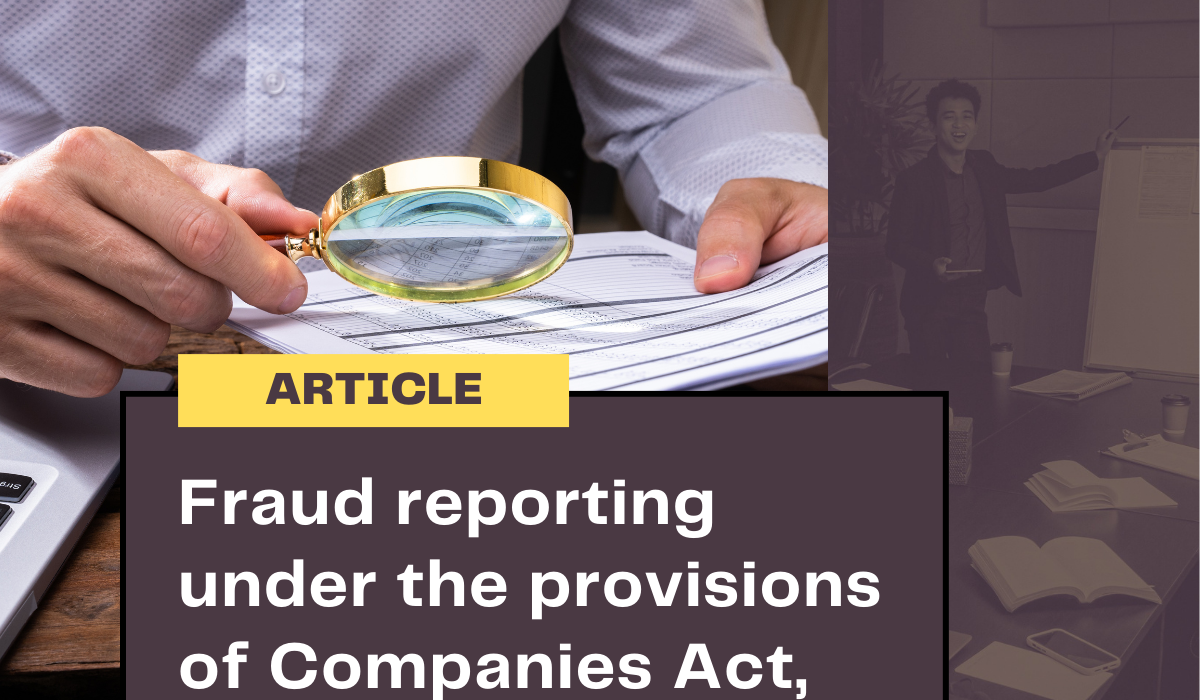Fraud reporting under the provisions of Companies Act, 2013
Introduction
By bare perusal of explanation of Section 447 mentioned in the Companies Act, a broad definition of fraud is reflected which demonstrated that., (i) fraud‖ in relation to affairs of a company or any body corporate, includes any act, omission, concealment of any fact or abuse of position committed by any person or any other person with the connivance in any manner, with intent to deceive, to gain undue advantage from, or to injure the interests of, the company or its shareholders or its creditors or any other person, whether or not there is any wrongful gain or wrongful loss;
(ii) wrongful gain‖ means the gain by unlawful means of property to which the person gaining is not legally entitled;and
(iii) wrongful loss‖ means the loss by unlawful means of property to which the person losing is legally entitled.
Apart from the broad definition of fraud, the Companies Act 2013 also provides a stringent punishment to any person who is found guilty of committing fraud viz., an imprisonment for a term which shall not be less than six months but which may extend to ten years and shall also be liable to fine which shall not be less than the amount involved in the fraud, but which may extend to three times the amount involved in the fraud.
Further, the Act 2013 also establishes reporting and review mechanisms involving both internal and external stakeholders, aimed at enhancing transparency and accountability within corporate structures, helping to prevent, detect, and address instances of fraud.
The Companies Act has increased the role and authority of the Serious Fraud Investigation Office (SFIO), effectively operationalizing it to detect, investigate, and prosecute white-collar crimes and corporate fraud across India. The SFIO is vested with extensive powers, including the authority to conduct inspections, obtain documents, search and seize evidence, and make arrests, among other functions. In addition to the SFIO, the Companies Act established the National Financial Reporting Authority (NFRA), which also plays its role in overseeing and enforcing adherence to the accounting and auditing standards specified under the Act. The Act also mandates a whistle-blower or vigil mechanism for certain categories of companies, providing employees and other stakeholders with a structured channel to report unethical practices.
Fraud reporting under the Act, 2013
Under Section 143(12) of the Act, 2013, if a company’s auditor, while performing their duties, suspects or becomes aware of any fraudulent activity committed by the company’s officers or employees, they will report this to the Central Government immediately, following the prescribed timeline and procedure.
Furthermore, Section 143(13) of the Act, 2013 ensures that the auditor will not be considered in violation of any confidentiality obligations (such as those under the Chartered Accountants Act, 1949) for reporting fraud in good faith.
It is important to note that Section 143(12) of the Companies Act, 2013 must be read alongside the applicable rules, particularly Rule 13 of the Companies (Audit and Auditors) Rules, 2014. This rule outlines specific steps for auditors who suspect or identify fraud involving an amount of INR 1 crore or more committed by a company’s officers or employees. In such cases, the auditor is required to report the suspected fraud to the company’s board or audit committee within two days of becoming aware of it and request their response or observations within 45 days. Upon receiving the board or audit committee’s response, the auditor is required to forward the report, along with any comments, to the Central Government within 15 days, as per the format of Form ADT-4.
For instances of fraud involving amounts less than INR 1 crore, the auditor is required to report directly to the board or audit committee within two days of detecting the fraud.
The mandate for the auditors to report to the Central Government prior to the National Financial Reporting Authority’s Circular of June 2023 (“NFRA Circular”)
In february 2016, the Institute of Chartered Accountants of India (ICAI) issued a Guidance Note on Reporting on Fraud (“ICAI Guidance Note”). The key aspects of the said Guidance Note clarify that the reporting obligation under Section 143(12) applies specifically to: firstly frauds committed by the company’s employees or officers, not by third parties such as vendors or customers; secondly frauds that have a financial impact on the company, with the auditor assessing this based on relevant Standards on Auditing; and thirdly frauds identified in the course of conducting an audit.
The mandate for the auditors to report fraud after National Financial Reporting Authority’s Circular of June 2023 (“NFRA Circular”)
The National Financial Reporting Authority (NFRA) was established under Section 132 of the Companies Act, 2013 as a regulatory authority for accounting and auditing standards. NFRA has been given broad authority to monitor and enforce compliance with these standards and to serve as a disciplinary body for the auditing profession. Additionally, it holds the powers of a civil court on aspects such as discovery and production of books of accounts, issuing summons, and inspecting books and registers, among others.
On June 26, 2023, NFRA had issued a circular “NFRA June 26 Circular” wherein it has demonstrated that a statutory auditor is required to submit form ADT-4 to the Central Government under Section 143(12) of the Act, 2013, even if they are not the first to identify the fraud or suspected fraud. So, when an auditor submits a fraud report in the Form ADT-4 regarding to the Central Government as specified in Section 143(12) of the Companies Act, 2013, it is typically directed to the MCA, which oversees the enforcement and compliance of company law matters through bodies like the NFRA. Furthermore, the NFRA emphasized that an auditor’s resignation does not exempt them from the legal obligation to report any suspected fraud or confirmed fraud. The para 4.2 of the NFRA Circular demonstrated that “The Statutory Auditor is duty bound to submit Form ADT-4 to the Central Government u/s 143(12) even in cases where the Statutory Auditor is not the first person to identify the fraud/suspected fraud.” However, the abovementioned para is not in sync with the language of Section 143(12) of the Act and the general practice followed by the auditors.
Since NFRA is a statutory body established under Section 132 of the Companies Act, 2013, its directives are generally regarded as having greater authority than the ICAI Guidance Note, which does not carry the “authority of law.” As such, the ICAI Guidance Note is not legally binding on the Ministry of Corporate Affairs (MCA).
There may be numerous instances where the auditor and the Board or Audit Committee hold differing views on whether certain actions or omissions constitute fraud, employee corruption, or simply a code of conduct violation. For example, if the auditor identifies questionable documents/bills/invoices during an audit that suggest potential impropriety or illegality, the auditor should first determine whether these documents or bills are constituting fraud or not. The responsibility under Section 143(12) to report fraud to the Central Government lies with the auditor, hence the auditor has greater responsibility to exercise it in caution and diligence before submitting any such report to the MCA.
Authored by:
Adv Anukriti, SUO Law Offices.



